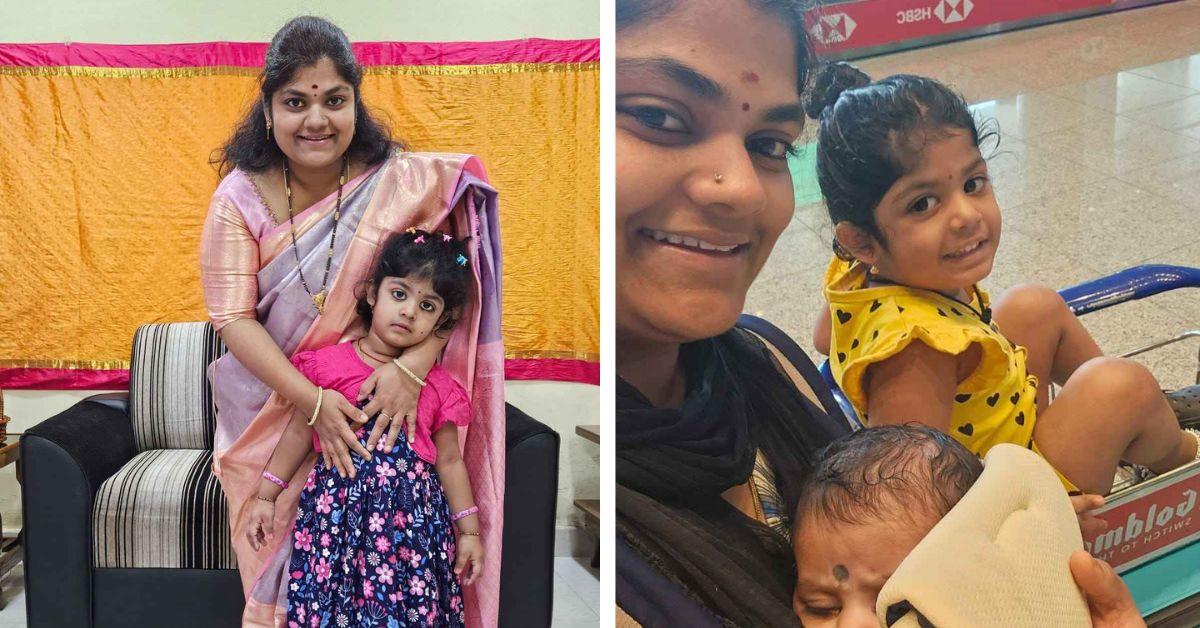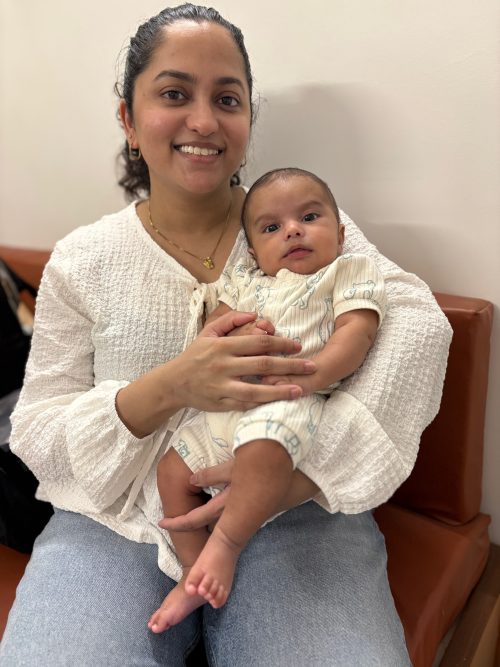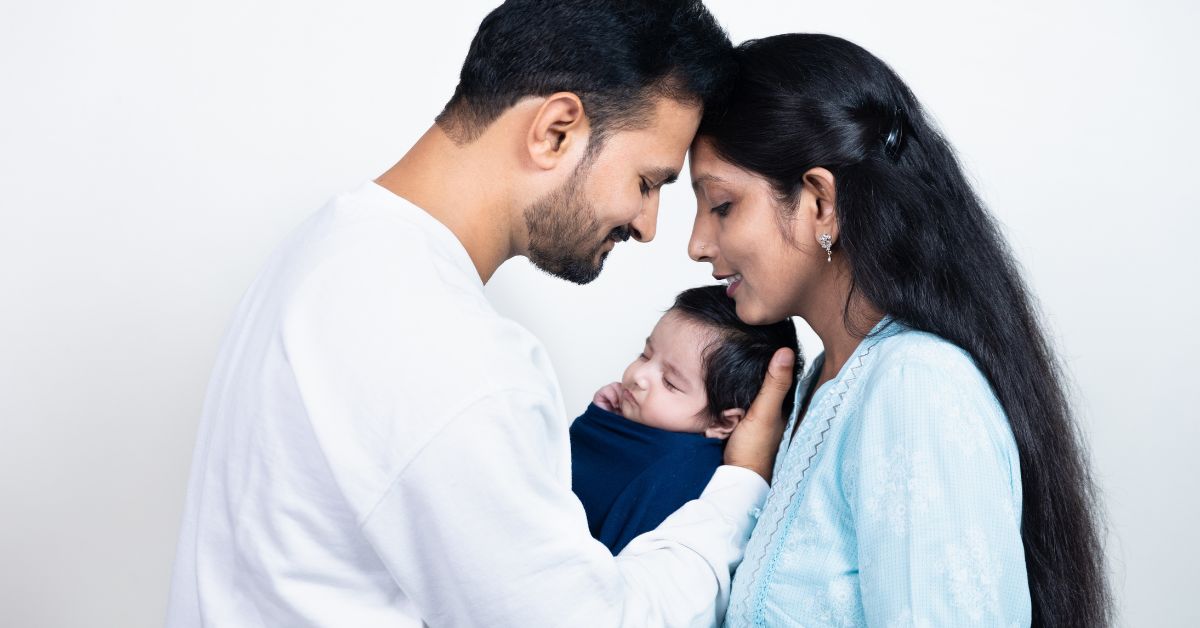‘Only My Husband Asked If I Was Okay’: New Moms Share How Postpartum Support Helped Them Heal
“There were so many people around me… but it was only my husband who asked if I was okay.”
For M Sharanya, those early weeks after childbirth weren’t just about sleepless nights or recovering from a C-section. They were a test of patience, strength — and support.
Across India, postpartum is often marked by isolation, exhaustion, and silent struggle. But it doesn’t have to be that way. With care from their families — especially their husbands — new mothers can find calm in the chaos and comfort in the small, everyday acts of love.
Two such women share their stories — of healing, of being seen, and of what it truly means to support a new mother.
‘I can give it all to my in-laws’
For M Sharanya, the early weeks after childbirth were nothing short of life-altering. Recovering from a C-section while tending to a newborn was physically draining — but what made the difference, she says, was her support system.
Sharanya, a Hyderabad-based mother of two girls who works at the Food Corporation of India, gave birth to her first child during the pandemic. “For the sake of the baby, both my mother-in-law and father-in-law decided to quit their jobs and look after her. This was such a relief — I could enjoy my maternity break and also confidently get back to work after six months,” she says.
 Sharanya says her family’s support helped her heal and reminded her to hold on to the positives, not the pain.
Sharanya says her family’s support helped her heal and reminded her to hold on to the positives, not the pain.
Her biggest challenge, however, was breastfeeding. “My 60-year-old mother-in-law took full charge of that challenge and ensured my baby was always well-fed.”
Sharanya moved between her parents’ and in-laws’ homes in those early months. “My mother ensured I got all the care and rest to recover from my C-section,” she adds.
Sharanya says the experience taught her an important lesson. “There are always positives and negatives in every situation. But what matters is what you choose to hold on to.” It was the care she received — from her husband, her parents, and her in-laws — that helped her move forward with strength and clarity. “Because of them, I could let go of the stress and focus on healing,” she adds.
But above all, it was her husband’s quiet attentiveness that stood out. “There may be so many people around a woman post-childbirth, but it’s always the husband she looks out for,” she reflects. “While everyone took care of the baby and was always worried about the newborn, my husband was the only one who used to ask me if I had taken my medicines on time. After all, it’s the little things that really matter to a woman during that phase.”
‘My husband took a month off to be there for me’
For Aminta, becoming a mother was preceded by years of loss and uncertainty. “It took us three years, two miscarriages, and three failed IUIs before I finally got pregnant,” she shares.
The pregnancy itself was far from smooth. At 28 weeks, she was found to be partially dilated and was advised to undergo treatment and partial bed rest. When the condition returned, she was placed on full bed rest until delivery. At 38 weeks, Aminta and her husband, Neil, finally welcomed a healthy baby boy.
 Through it all, Neil’s gentle words and daily check-ins kept her going and strengthened their bond.
Through it all, Neil’s gentle words and daily check-ins kept her going and strengthened their bond.
“The first month of my postpartum was smooth, all thanks to my mother,” she says. “My husband took a month off just to be there for us and make sure we had enough support.” But when her mother had to leave, things quickly got overwhelming. “We decided to move in with my parents without a second thought.”
A budding entrepreneur based in Mumbai, Aminta didn’t have the privilege of extended maternity leave. “I just got a two-month break post-delivery, and now, I am back at work. So I am juggling between work calls, getting work done for my business, handling the baby, and healing post-delivery.”
She also had to navigate the barrage of unsolicited advice. “One of our relatives, who stays abroad, messaged me after my baby was born and advised me to tie my belly tight so that I don’t have a hanging belly all my life. I also received unwanted advice on breastfeeding. I think all these only add more stress in our postpartum journey,” she says.
Through it all, Neil’s gentle encouragement helped her stay afloat. “He always would come and ask me if I am okay, and appreciate me by saying I am doing a good job with everything. He is the one who gives me a positive push. We, as a couple, check in on each other every evening to ensure we are doing fine, and that helps us in our relationship, too,” she says.
Still, the emotional toll of childbirth lingers. “It’s only been 11 weeks and I am yet to come out of my labour experience. It was traumatising for both my husband and me. I am still trying to figure out how I have changed after delivery.”
What happens during the postpartum period?
Postpartum — or the puerperium period — typically lasts six to eight weeks and brings major physical and psychological changes. The body begins to heal: the uterus contracts, bleeding gradually decreases, hormones drop, and breastfeeding begins. But parallelly, many women experience sleep deprivation, mood swings, panic attacks, or overwhelming emotions.
 With support, follow-ups, and the right guidance, recovery is absolutely possible, says Dr Harish. (Representational picture source: Shutterstock)
With support, follow-ups, and the right guidance, recovery is absolutely possible, says Dr Harish. (Representational picture source: Shutterstock)
Dr Harish Chandra Reddy, Consultant Psychiatrist in Hyderabad, says, “Usually postpartum blues are something a lot of new mothers experience — they feel anxious, have mood swings and sleep disturbances. This generally resolves with some support from family and adequate rest.”
He adds, “The husband plays an important role during this period. It’s a challenging role to be able to understand the mood swings and symptoms, along with taking care of the child and other commitments. The way a husband manages the situation, his presence, his affection — all such gestures can be of great help.”
When to seek help
If the emotional challenges of the postpartum period last beyond two weeks, it may point to Postpartum Depression (PPD), which can bring intense mood changes, frequent crying, or feelings of being overwhelmed. In rare cases, some mothers may experience more severe symptoms, known as Postpartum Psychosis, which can include confusion, unusual thoughts, or strong emotional distress.
“These conditions are treatable with the right care,” says Dr Harish. “With support from loved ones, regular follow-ups, and professional guidance — often a mix of counselling and medication — recovery is very much possible. In most cases I’ve seen, mothers began to feel better within two to three weeks. Even when hospitalisation was needed, one mother recovered steadily within 10 days.”
With the right care, postpartum doesn’t have to be a story of struggle. As Sharanya and Aminta show, it can also be a journey of healing, strength, and rediscovery — especially when women are not left to do it alone.
Edited by Khushi Arora
News